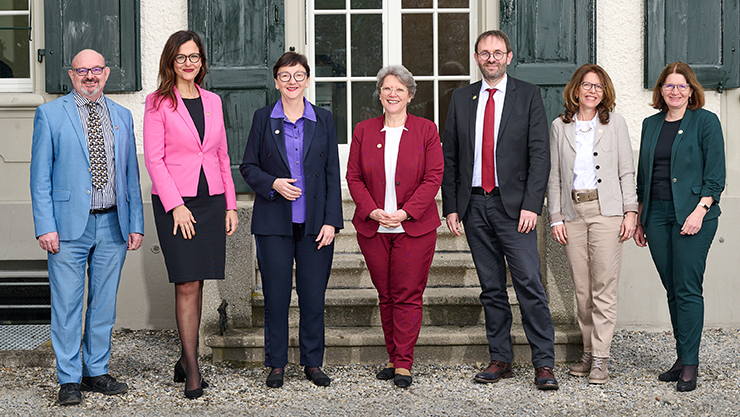Standing Council members Rita Famos (President), Ruth Pfister (Education and Culture), Pierre-Philippe Blaser (Values and Orientations), and Claudia Haslebacher (External Relations and Ecumenism) met yesterday with newly elected members Lilian Bachmann, Catherine Berger, and Philippe Kneubühler for the Council’s constituent meeting. The newly vacant department positions were filled there: Lilian Bachmann will now be responsible for Public Relations and Aid Agencies, Philippe Kneubühler for Worship and Church Development, and Catherine Berger for Diaconal and Pastoral Services. Catherine Berger and Pierre-Philippe Blaser are the new Vice Presidents of the Council.
The Council also appointed Ruth Pfister and Claudia Haslebacher to the Human Resources and Finance Committee and approved a schedule for the development of legislative goals. PCS President Rita Famos is very happy about the constructive working atmosphere on the Council: “We began our work with a great deal of enthusiasm and in a good collegial atmosphere. I am looking forward to the February retreat with my colleagues to take on the planning of legislative goals and to focus on the greatest challenges facing the PCS.”
Mathilde Sabbagh and József Kiss were welcomed as guests by the PCS Council on the second day of the session. Sabbagh is a pastor of the National Evangelical Synod in Syria and Lebanon (NESSL) and was the first Syrian woman to be ordained by her church in April 2022. She had already been leading a church community in the north of the country since 2016, which has been providing emergency aid in the face of the precarious humanitarian situation. Supported by Swiss Church Aid (HEKS/EPER), they provide local weekly programs for children and women, as well as a Sunday school and school scholarships. “We will continue to help as long as there are local people who need us. The children in our care are the future of the country. When I open the church doors for them in the morning, I forget the severity of the situation for a brief moment,” Sabbagh told the Council.
Kiss is a pastor of the Reformed Church in Romania in the church district of Transylvania. In his diocese near the Ukrainian border, he has been working with his team and volunteers for the past year to support hundreds of Ukrainian refugees and thousands of internally displaced people in neighboring Transcarpathia. The war has been making the situation there increasingly difficult. As Kiss explained: “The church has an important role to play in this crisis. It is the Bible that provides us with the motivation for our commitment: As the Gospel says, whatever you did for one of the least of my brothers, you did for me. We hope that thanks to the support from Swiss Church Aid we will be able continue to operate our welcome centers and hope that the war will end soon.”
Swiss Church Aid (HEKS/EPER) is extensively active in both crisis-hit regions. Both partner churches enjoy great trust among their local populations, are supported by numerous volunteers, and provide their aid to people across religious and ethnic divides. Both Sabbagh and Kiss spoke at a Swiss Church Aid conference in Bern on January 21, touching on the role of local churches in times of crisis. HEKS/EPER and the PCS are jointly involved in this “Church Cooperation” program. As Lilian Bachmann, the new head of the Public Relations and Aid Agencies Department, expressed it: “HEKS is active locally with networks in both the Middle East and Eastern Europe and is able to help people in those war zones. Through its great commitment, Swiss Church Aid has been making a contribution to protecting the weakest and to justice and peace.”
